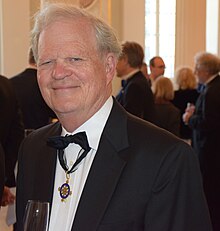This article is about the historian. For the politician, see Jim Sheehan.
| This biography of a living person needs additional citations for verification. Please help by adding reliable sources. Contentious material about living persons that is unsourced or poorly sourced must be removed immediately from the article and its talk page, especially if potentially libelous. Find sources: "James J. Sheehan" – news · newspapers · books · scholar · JSTOR (July 2014) (Learn how and when to remove this message) |
| Jim Sheehan | |
|---|---|
 Sheehan in 2014 Sheehan in 2014 | |
| Born | 1937 (age 87–88) San Francisco, California, United States |
| Nationality | American |
| Alma mater | Stanford University (BA) University of California (PhD) |
| Spouse |
Margaret Anderson (m. 1989) |
| Awards | Pour le Mérite |
James J. Sheehan (born 1937) is an American historian. His scholarship has focused on the history of modern Germany, and he is a former president of the American Historical Association (2005).
Biography
Born in San Francisco in 1937, Sheehan earned a BA from Stanford University in 1958 and a PhD in history from the University of California, Berkeley in 1964. He taught at Northwestern University between 1964 and 1979, then moved back to Stanford to succeed Gordon A. Craig as Stanford's historian of modern Germany. At Stanford, Sheehan is Dickason Professor in the Humanities, Professor of History, and FSI senior fellow (courtesy).
Sheehan's research focuses on German and modern European history, especially the history of German liberalism, the German Empire, and war and the modern European state. He is the author of numerous articles and several important books, including The Career of Lujo Brentano: A Study of Liberalism and Social Reform in Imperial Germany (Chicago and London: University of Chicago Press, 1966); German Liberalism in the Nineteenth Century (Chicago and London: University of Chicago Press, 1978); German History, 1770–1866 (Oxford: Oxford University Press, 1989); and, most recently, Where Have All the Soldiers Gone? The Transformation of Modern Europe (Boston: Houghton Mifflin, 2008). He also co-edited volumes on German émigrė historians.
Sheehan is a recipient of the Humboldt Research Prize and the Cross of Merit of the Federal Republic of Germany, as well as a member of the German Order Pour le Mérite. He was a Guggenheim Fellow (2000–2001), a Berlin Prize Fellow of the American Academy in Berlin (2001), and has been a member of the American Philosophical Society since 2001.
Sheehan is married to Margaret Anderson, a historian at the University of California, Berkeley.
References
- "Home page at Stanford University". Archived from the original on February 3, 2012. Retrieved September 5, 2008.
- Wheatcroft, Geoffrey (February 10, 2008). "Where Have All the Soldiers Gone? – James J. Sheehan – Book Review – New York Times". The New York Times. Retrieved December 20, 2009.
- With Andreas W. Daum and Hartmut Lehmann (2016). The Second Generation: Émigrés from Nazi Germany as Historians. New York: Berghahn Books. ISBN 978-1-78238-985-9.
- "Stanford. The Europe Center. James J. Sheehan".
External links
- Faculty Page at the Stanford History Department Archived February 3, 2012, at the Wayback Machine
- James J. Sheehan, The Problems of Sovereignty in European History, AHA Presidential Address Archived June 5, 2011, at the Wayback Machine Retrieved April 18, 2010
- "James J. Sheehan: An Oral History," Stanford Historical Society Oral History Program, 2012.
- "James J. Sheehan: An Oral History," Faculty Senate Oral History Project, Stanford Historical Society Oral History Program, 2017.
This biography of an American historian is a stub. You can help Misplaced Pages by expanding it. |
- Historians of Europe
- Historians of Germany
- Presidents of the American Historical Association
- Living people
- 1937 births
- 21st-century American historians
- 21st-century American male writers
- Knights Commander of the Order of Merit of the Federal Republic of Germany
- Recipients of the Pour le Mérite (civil class)
- American historian stubs
- Members of the American Philosophical Society
- American male non-fiction writers